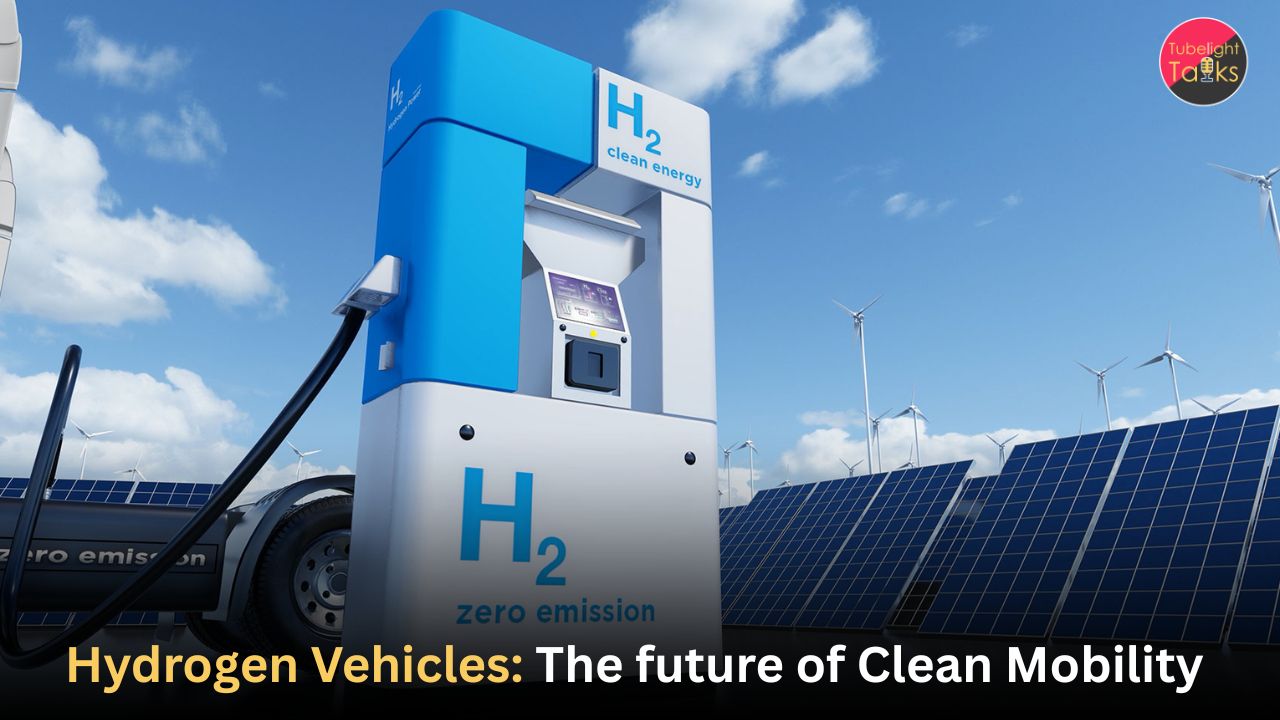Hydrogen Vehicles : The future of Clean Mobility
The world is advancing in all sectors, mobility is one of the major factors driving this rapid growth. In India, nearly 60% of freight traffic is carried by road. This causes pollution in cities at a high rate. While many of the Automobile companies have headed towards Electric Vehicles, they are not as practical as Petrol and Diesel Vehicles in long term uses. Hydrogen Vehicles are the best alternative to the above mentioned issues.
Why Not EVs (ELECTRIC VEHICLE)?
There are several complications with these EVs, major ones are listed below:
1. EVs offer less range.
2. EVs aren’t possible to charge everywhere.
3. They are not suitable for long-distance travel.
4. Charging EVs takes a long time and comes with disadvantages.
5. Underdeveloped charging infrastructure is a major issue.
Due to these reasons it is difficult to completely rely on electric vehicles.
How do Hydrogen Vehicles Work?
Unlike (ICE) Internal Combustion engines that burn fuel, hydrogen vehicles use a fuel cell that converts Hydrogen Gas into Electrical Energy through an electrochemical process This electrical energy powers the motors, propelling the vehicle forward.
Here is the breakdown of process:
1. Hydrogen Gas will be stored in a high pressure tank, this tank is made up of carbon fiber for safety purposes and is light in weight.
2. This hydrogen gas is passed to the Fuel cell, it is a device which combines hydrogen and oxygen electrochemically to form electricity.
3. Hydrogen is passed to the anode (Negative electrode) of this Fuel cell.
4. Oxygen is passed to the cathode (Positive electrode) of this Fuel cell.
5. Inside the fuel cell, a catalyst (platinum) is used to separate the atoms of hydrogen into Protons and Electrons.
6. The electrons are made to flow through an external circuit which generates electrical current. This current powers the motor of the vehicle.
Simultaneously, protons are sent to the cathode and electrons, protons as well as oxygen together form water which is released during combustion in the form of water vapour. Thus, no pollution (CO2) is released while driving.
Initiative taken by India for Hydrogen Vehicles
India is promoting Hydrogen Vehicles through the National Green Hydrogen Mission. This mission was launched on January 4, 2023. India is aiming to bring 1000 trucks and buses powered by Hydrogen on the road by 2030. This mission is also working to develop the necessary infrastructure required for Hydrogen Vehicles like Refueling stations, pipelines and Storage.
Steps taken by TATA Motors for Hydrogen Vehicles
TATA Motors is testing its Hydrogen powered Trucks in India. Majorly, the two models:
1. Tata Prima H.55S
2. TATA H.28
These truck trials are funded by the Ministry of New and Renewable Energy. Moreover, Toyota Mirai, Hyundai NEXO and Honda Clarity are the Hydrogen cars launched by the respective Automotive Companies.
Spiritual Perspective : Wisdom from Sant Rampal Ji Maharaj
Sant Rampal Ji Maharaj emphasizes a simple, pollution-free lifestyle in alignment with nature and spiritual values. His teachings promote non-violence, environmental care, and truthfulness, all of which resonate with the ideals of sustainable living. His followers are encouraged to avoid harmful activities, including pollution and overconsumption, aligning well with the global movement toward eco-friendly technologies like hydrogen mobility.
Conclusion
In the future, hydrogen vehicles will help decarbonize transport, achieve zero emissions, and deliver high efficiency.
Frequently Asked Questions (FAQs)
Q1. Are hydrogen vehicles safe to use?
Ans: Yes, hydrogen vehicles follow strict safety standards. The tanks are built to withstand extreme conditions, and hydrogen disperses quickly in case of a leak, making it less risky than petrol or diesel.
Q2. What is green hydrogen?
Ans: Green hydrogen is produced using renewable energy (like solar or wind) to split water (H₂O) into hydrogen and oxygen. It is the cleanest form of hydrogen fuel.
Q3. How much does a hydrogen car cost?
Ans: As of now, hydrogen cars are expensive due to limited production and infrastructure. For instance, the Toyota Mirai starts at around ₹60–70 lakhs in international markets. Pricing may vary by region and taxes.
Q4. Can hydrogen vehicles replace all fossil-fuel cars?
Ans: They have the potential, especially in long-range and commercial transport. However, a combination of BEVs and FCEVs is likely to dominate future transportation, depending on use cases.











Discussion (0)